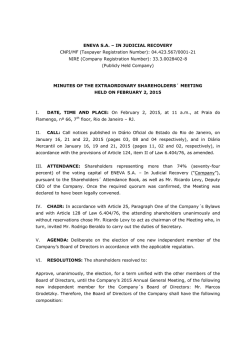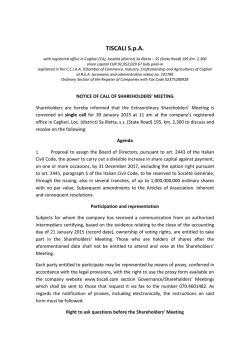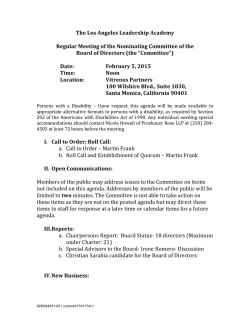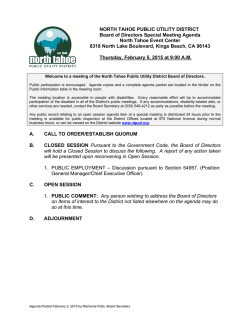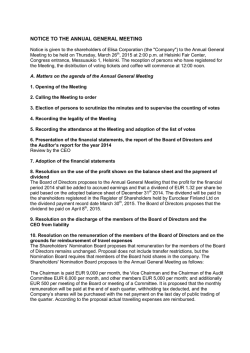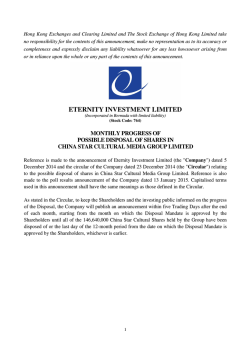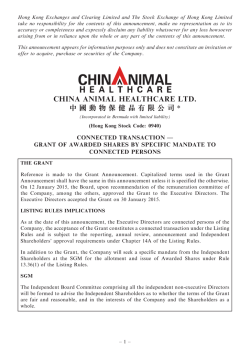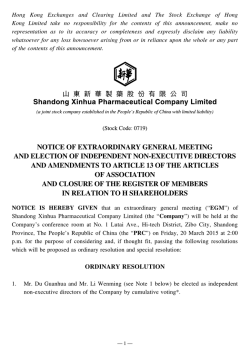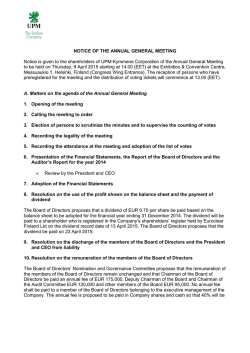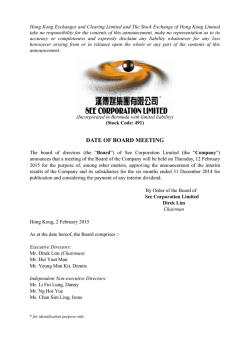
General Shareholders Meeting and Board of Directors
Grupo Aval S.A. General Shareholders’ Meeting and Board of Directors GRUPO AVAL ACCIONES Y VALORES S.A. has governing and administrative bodies that set the guidelines of its corporate management and execute and accomplish actions aimed at carrying out its corporate purpose pursuant to the law and its bylaws. General Shareholders' Meeting The highest governance body is the General Shareholders' Meeting, which is made up of the shareholders listed in the book entitled the "Stock Ledger", or of their representatives or proxies, as described in the provisions of the law and the bylaws. 1.1. Meetings Ordinary meetings of the General Shareholders' Meeting shall be held two (2) times each year by no later than the last business day of the months of March and September in order to review the Company's situation, nominate administrators and other officials for election, set the economic guidelines for the Company, approve the statements and balances of the last fiscal year, make decisions about profit sharing, and agree on any measures necessary to ensure the fulfillment of the corporate purpose. If the meeting has not been called otherwise, the General Shareholders' Meeting shall automatically convene on the first (1) day of the month of April at ten o'clock in the morning (10:00 a.m.) at the official domicile where the Company's management has its offices. The General Shareholders' Meeting may be convened for extraordinary meetings by: a) The President. b) The Board of Directors, on its own initiative or when requested by multiple shareholders representing at least fifteen percent (15%) of the subscribed shares, when there is sufficient evidence to believe that the Meeting is necessary to guarantee their rights or to provide information that they do not have. This request shall be made in writing directed to the company's department in charge of shareholder and investor service. c) The Certified Public Accountant, or d) The Superintendence, when authorized by Law or when requested by multiple shareholders representing at least fifteen percent (15%) of the subscribed stock. Likewise, the Meeting shall convene upon the request of multiple shareholders representing no less than one-fourth of the share capital, in which case an announcement must be made by the Board of Directors, Legal Representative or CPA. 1.2. Quorum The quorum to deliberate shall be multiple shareholders who represent at least an absolute majority of subscribed shares, i.e., half of the subscribed shares plus one. The decisions of the General Shareholders' Meeting shall be made, in general, by the majority of votes present, except for the special majorities described in the bylaws and required by law, in which case these shall take precedence. Decisions of a general nature made by the General Shareholders' Meeting in accordance with the law and the bylaws shall be binding for all members, including those who are absent or who dissent. If a meeting is announced but not held due to lack of quorum, a new meeting will be scheduled that will be held and will make decisions as long as multiple shareholders are present, regardless of the quantity of the shares represented. The new meeting shall be held no sooner than ten (10) and no later than thirty (30) business days from the date scheduled for the first meeting. If the General Shareholders' Meeting automatically convenes at an ordinary meeting on the first business day in the month of April, it may also deliberate and make decisions according to the same terms. 1.3. Meeting Announcements All announcements shall be published in a newspaper with broad circulation. The announcement of the meeting of the General Shareholders' Meeting shall be made at least five (5) calendar days in advance. For meetings in which the fiscal year-end financial statements will be approved, the announcement must be made at least fifteen (15) business days in advance. The issuance of the announcement shall be recorded in the minutes of the corresponding meeting. Nevertheless, the General Shareholders' Meeting may meet without prior announcement when there is representation of all the subscribed stock. 1.4. Functions The following are the functions of the General Shareholders' Meeting: 1) Adopt measures in the Company's interest; 2) Elect and freely remove primary and alternate members of the Board of Directors; 3) Elect and freely remove the CPA and his or her alternate. Shareholders may nominate candidates for the post of the Company's Certified Public Accountant (and alternate). These nominations shall be discussed in the General Shareholders' Meeting, and after an assessment, an election will be held; 4) Set the compensation for the members of the Board of Directors and the Certified Public Accountant; 5) Order that appropriate actions be taken against Managers, Officials, Executives or the Certified Public Accountant; 6) Review the reports of the Board of Directors and the CPA. Examine, approve and challenge the year-end financial statements, and close or annotate the associated statements; 7) Establish necessary reserves beyond the legal reserve; 8) Pursuant to the law and these bylaws, decide on profit sharing by determining the amount of the dividend, and the means and deadlines of its payment; 9) Amend these bylaws with a majority vote of those present; 10) Appraise in-kind assets received as payment for the subscription of shares with a majority vote of those present minus the shares corresponding to the contributors, who may not vote on this matter; 11) Rule that a specific issuance of common shares be placed not subject to subscription right by means of a vote of seventy percent (70%) of the shares present; 12) Authorize the issuance, when deemed appropriate, of preferred shares without voting rights; 13) Authorize with a unanimous vote of all subscribed shares the entry of the Company as a shareholder of another collective company; 14) Evaluate the management of the Company's Board of Directors through a review and approval or rejection of the semi-annual management report that must be submitted for the Shareholders' Meeting's consideration; 15) To determine the maximum amount up to which the Company can make donations that support charitable causes for the community, or specific sectors of the community (for example, causes benefiting health, education, culture, religion, democracy, athletics; scientific and technological research; ecology and environmental protection; the defense, protection and promotion of human rights; legal access, social development programs, disaster relief, etc.) and that help promote the Company's image as part of its social responsibility. The General Shareholders' Meeting shall have the power to decide on the specific sectors to which these donations shall be made. In each meeting, the board of directors will submit to the consideration of the General Shareholders' Meeting its recommendations with respect to the maximum amount up to which the Company can make donations and the specific sectors to which these donations shall be made. PARAGRAPH: The maximum amount up to which the Company is authorized to make donations shall survive until its complete use; 16) Any others required by law or the bylaws and do not correspond to other bodies. 1.5. Right of Inspection Management shall allow the shareholders or their representatives to inspect the Company's books and documents during the fifteen (15) business days leading up to the meeting. In the event that a possible merger, division, or transformation of the company or an increase of the authorized capital or a reduction of the subscribed is to be discussed, the shareholders shall have the right to review the corresponding proposals within the term of announcement of meetings. The Board of Directors The Board of Directors is the company's highest administrative body. Its primary function is to determine the company's management and development policies, and to ensure that the President and executive team comply with and abide by these policies. 2.1. Election Board members shall have a term of one (1) year and may be re-elected for an indefinite number of terms or freely removed by the General Shareholders' Meeting before the expiration of the term. If, at the expiration of the term, the General Shareholders' Meeting has not held a new election, the previously elected directors shall remain in their positions. The Board of Directors shall be composed of seven (7) primary members and their seven (7) personal alternates. At least twenty-five percent (25%) of the members of the Board of Directors shall be independent in nature. The President shall attend the meetings of the Board of Directors. He or she is allowed to speak but not vote, unless he or she is a member of the Board, in which case he or she may speak and vote. For purposes of electing members of the Board of Directors, the electoral quotient system shall be applied. The morals and professional experience of the candidate shall be taken into consideration in the election of members of the Board of Directors. The Board of Directors shall have a Chair elected from among the directors, as well as a Secretary who may be a director or another person. Alternate board members shall replace primary board members during permanent or temporary absences, but they may be called to participate in the Board's deliberations, even when they would not otherwise be required to attend, in which case the alternate shall be able to speak but not vote in the deliberations and shall be paid the same compensation as the primary board members. 2.2. Meetings The Board of Directors shall hold ordinary meetings at least once a year. It may also hold extraordinary meetings when ordered by the Chair or at least two of the board members. 2.3. Quorum The Board of Directors' deliberations shall be valid with a majority of its members present. Decisions shall be made by means of majority vote. 2.4. Funciones The following are the functions of the Board of Directors: 1) Establish the rules of procedure for the Board; 2) 2. Establish the necessary departments for the proper operation of the Company, assign their responsibilities and determine the fees; 3) Appoint and freely remove the President, set the President's compensation, and make decisions about the President's resignation or termination; 4) Evaluate the President's management and that of the other Company executives by reviewing the management report at the end of each semester and on any other occasions required by law or the Board of Directors; 5) Designate the President's alternates; 6) Convene the Shareholders' Meeting so it can decide on the resignation of members of the Board of Directors and of the CPA; 7) Convene the Shareholders' Meeting for any other purpose; 8) Decide on matters submitted by the Chair of the Board; 9) Submit an fiscal year-end report to the General Shareholders' Meeting along with statements, balance sheets, inventories, and a profit sharing proposal. The management report, which will be submitted in conjunction with the Company Management, will include a description of the Company's primary risks, along with information about internal control activities and any relevant findings, should there be any; 10) Authorize bond issuances; 11) Make decisions about storing certificates issued by the Company in a Central Securities Depository; 12) Exercise the powers that, according to the bylaws, are not assigned to the General Shareholders' Meeting; 13) Examine, when deemed appropriate, either directly or indirectly, the books, accounts, documents and cash flow of the Company; 14) Interpret the provisions of the bylaws that give rise to uncertainties and define their meanings before the next General Shareholders' Meeting so they can be submitted for review; 15) Delegate issues the Board deems appropriate to the President, provided that they can be delegated; 16) Order that any action or contract part of the corporate purpose be executed, and make the decisions necessary for the Company to meet its goals; 17) Authorize operations the purpose of which is to acquire, transfer, mortgage, encumber or limit immovable property, receive money as a loan, and any other document or contract whose amount exceeds TWENTY THOUSAND (20,000) LEGAL MINIMUM MONTHLY SALARIES and empower the President to sign such contracts or documents; 18) Adopt specific measures related to the governance, conduct and information of the Company in order to ensure the rights of those who invest in shares or any other security issued are respected and that proper management is employed and that this management is made public knowledge; 19) Oversee that the rights of all shareholders and other investors are respected under the parameters set by market regulating bodies; 20) Approve and revise the Code of Good Corporate Governance, which shall contain all the rules and mechanisms required by the General Shareholders' Meeting, the Board of Directors, the Company's Internal Regulations and the Law. Such power may be delegated to the President of the Company; 21) Ensure compliance with the Code of Good Corporate Governance; 22) Resolve possible conflicts of interest that may arise between employees and the Company. The procedures for resolving conflicts of interest shall be described in the Code of Good Corporate Governance adopted by the Company; 23) Oversee proper compliance with the Company's internal control policies and procedures; 24) According to the terms established in the Code of Good Corporate Governance, make decisions about conducting special audits requested by the Company's shareholders or investors that are not initially accepted by the legal representative; 25) Approve the share subscription regulations, which shall contain: a) The quantity of shares to be offered, which shall not be less than those already issued; b) The proportion and the way in which they can be subscribed; c) The term of the offer, which shall not be less than fifteen (15) days and not exceed one (1) year; d) The price at which they will be offered; e) The deadline for paying for the shares. To set the price at which the shares will be offered, it shall not be necessary to conduct the technical study described in Article 41 of Law 964 of 2005; 26) Designate the members of the Audit Committee from the members of the Board of Directors; 27) Respond to proposals submitted to the Board of Directors by multiple shareholders that represent at least five percent (5%) of the subscribed shares. Therefore, each proposal shall be read at the following ordinary meeting of the Board. A Board committee shall be designated to draft a response, although the Board may have the management do so instead. The Secretary of the Board shall respond in writing to the petitioners, clearly indicating the reasons that motivated the decisions, provided that the object of the proposals is not related to industry secrets or strategic Company information; 28) Authorize the donations the Company makes pursuant to the authorizations granted by General Shareholders' Meeting for this purpose. 2.5. Compensation The General Shareholders' Meeting shall set the compensation for Board of Directors members in accordance with the parameters in place for this type of company in the market and pursuant to its conditions. 2.6. Evaluation The General Shareholders' Meeting will evaluate the management of the Company's Board of Directors through a review and approval or rejection of the semi-annual management report that must be submitted for the General Shareholders' Meeting's consideration. Source: Grupo Aval Acciones y Valores S.A.’s, Corporate Governance Code and By-laws.
© Copyright 2026
